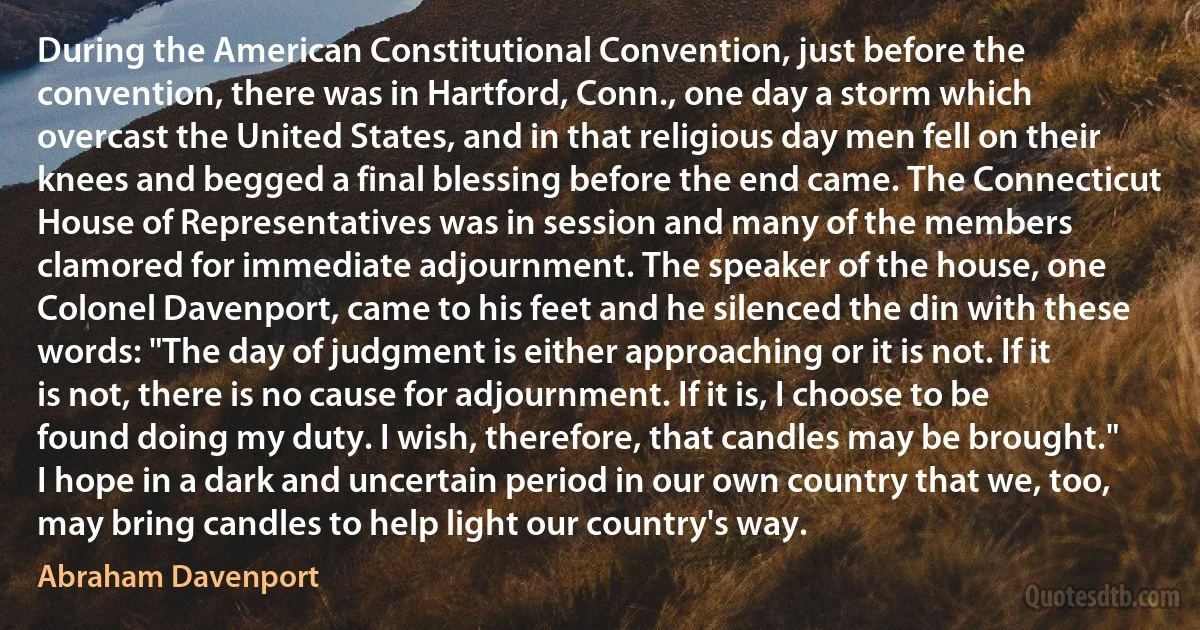Speaker Quotes - page 11
Lusty women can reclaim the name Archimage, Naming the fact that she is the Witch within our Selves. She is a verb, and she is verbal - a Namer, a Speaker- the Power within who can Name away the archetypes that block the ways/words of Metabeing. Archimage is a Metaphoric form of Naming the one and the many. She is power/powers of be-ing within women and all biophilic creatures. She points toward Metabeing, in which all Witches/Hags/Weirds participate, and in which we live, move, and have our be-ing pp. 86-87.

Mary Daly
The transparency law they'd passed earlier that applied to everybody else, they tried to keep it so it didn't apply to them. What they hadn't counted on was digitization, because that meant that all those paper receipts had been scanned in electronically, and it was very easy for somebody to just copy that entire database, put it on a disk, and then just saunter outside of Parliament, which they did, and then they shopped that disk to the highest bidder, which was the Daily Telegraph, and then, you all remember, there was weeks and weeks of revelations, everything from porn movies and bath plugs and new kitchens and mortgages that had never been paid off. The end result was six ministers resigned, the first speaker of the house in 300 years was forced to resign, a new government was elected on a mandate of transparency, 120 MPs stepped down at that election, and so far, four MPs and two lords have done jail time for fraud. So, thank you.

Heather Brooke
So that beginning with that report coming in as it did in 1915, it was laid on the table before the legislature, and by this time, Al Smith was the speaker of the House and well on the way to be governor. We had a very favorable audience and much of the legislation was enacted into law, oh, within a couple of years...

Frances Perkins
I was very fond of many of my comrades and leaders, but not one of them subsequently occupied my thoughts as much as Leo, while at that time he was apparently hardly noticed. Leo was one of our servants (who were naturally volunteers, as we were). He helped to carry the luggage and was often assigned to the personal service of the Speaker. This unaffected man had something so pleasing, so unobtrusively winning about him that everyone loved him. He did his work gaily, usually sang or whistled as he went along, was never seen except when needed - in fact, an ideal servant. Furthermore, all animals were attached to him. We nearly always had some dog or other with us which joined us on account of Leo; he could tame birds and attract butterflies to him. It was his desire for Solomon's key which would enable him to understand the language of the birds that had drawn him to the East.

Hermann Hesse
When a person tells others "Be good”, he conveys to his hearers the feeling that he is good and they are not. When he says "Be brave, honest and pure”, he conveys to his hearers the feeling that the speaker himself is all that, while they are cowards, dishonest and unclean.
To love God in the most practical way is to love our fellow beings. If we feel for others in the same way as we feel for our own dear ones, we love God.
If, instead of seeing faults in others we look within ourselves we are loving God.

Meher Baba
What a theme, and what a speech, and what a speaker, and how Oliver Cromwell himself would have been thrilled to hear the parliamentary cause elevated to its rightful pre-eminence... Writing as an impenitent Leveller who still begs to differ with you (and Oliver Cromwell) in so many matters, I still cannot withhold my wonder and excitement at what I heard there today.

Enoch Powell
In the last ten years, as editor in chief of Today's Caregiver Magazine, I have interviewed many people who are living in the public eye, all of them having something of importance to say to family caregivers. Most times they've become caregivers after becoming famous, usually due to themselves or a family member taking ill. Our keynote speaker today is unique in that he is a professionally trained caregiver before he became known to all of us. And through the unbelievable constraints that have been placed on his time, he's never lost sight of his goal of becoming a teacher and helping children living with developmental disabilities. Only his classroom has become a whole lot larger than he ever expected.

Clay Aiken
When César died in his sleep at the age of 66 on April 22, 1993, most people in the United States were unaware that his life had set an unsurpassed example of persistent struggle for human rights, day after day, week after week, year after year. Most people would not understand, for example, why César Chávez was compared to Gandhi and Martin Luther King Jr. by more than one speaker at the April 29 funeral, including Rep. Ron Dellums, who said: "César stands with the giants of this planet as an advocate of nonviolence as a way to challenge the powerful." Most people shamefully underestimated a heroic figure in the twentieth-century struggle for social justice, and an extraordinary labor leader.

Cesar Chavez
I realized that more and more I was saying, "It seems to me that we have come to the time war ought to be given up. It no longer makes sense to kill 20 million or 40 million people because of a dispute between two nations who are running things, or decisions made by the people who really are running things. It no longer makes sense. Nobody wins. Nobody benefits from destructive war of this sort and there is all of this human suffering." And Einstein was saying the same thing of course. So that is when we decided - my wife and I - that first, I was pretty effective as a speaker. Second, I better start boning up, studying these other fields so that nobody could stand up and say, "Well, the authorities say such and such "

Linus Pauling
Mr. Speaker, I rise this morning to say to Rush Limbaugh, "Shame on you." Shame on you for being the hatemonger that you are. Shame on you for being misogynistic. Shame on you for calling the women of this country sluts and prostitutes, because that's what he did. Ninety-eight percent of the women in this country, at some time in their lives, use birth control. And yet he went on the air recently and called Sandra Fluke a slut and a prostitute because she was trying to access birth control pills as a third-year law student at Georgetown.

Sandra Fluke
Madam Speaker, Rush Limbaugh's appalling attack on Georgetown student Sandra Fluke is no isolated incident, but part of a broader GOP assault on women's health. Republicans have ushered in Women's History Month with legislation to allow employers and insurance companies to deny women needed health coverage.

Sandra Fluke
How can the Universe tell its own story save by making use of human speech; how convey its meanings to finite minds save by employing a thinker to declare them? So long as the story remains unspoken, unwritten, can we say it exists at all? Does not the significance of things become a story by the very process which ends in the movement of an intelligently guided pen over a sheet of paper, in the reading of printed types, in the utterance of recognised vocables; and until this process has been accomplished is not the "meaning” a mere promise or unrealized potency? Can we learn the history of the world, and of human life, otherwise than by reading, or hearing it spoken? How, then, can we receive it without the intermediation of a writer, a speaker?

L. P. Jacks
We were in Cooperstown (NY) a few years ago. Baseball's Hall of Fame Museum was full of visitors on a sunny morning. Among them were Pirates and Tigers players in baseball uniforms, sans spikes. They were to meet in an exhibition game an hour later. Roberto Clemente had a small camera whirring every few minutes. He was taking pictures of the enshrined plaques and other mementos of yesteryear's super stars ... Honus Wagner, Ty Cobb, Christy Mathewson, Tris Speaker, Grover Alexander ... to name a few. A Pittsburgher said to Roberto, "This is where you belong. Some day they will be taking pictures of your shrine here." "Thank you," he replied. "I guess a fellow like me has to die to get voted in by the writers."

Roberto Clemente
About 1932 one of Sapir's students at Yale, Benjamin Lee Whorf drew on Sapir's ideas and began an intensive study of the language of the Hopi Indians of Arizona. Whorf's brilliant analysis... seemed to support the view that man is a prisoner of his language. Whorf emphasized grammar-rather than vocabulary, which had previously intrigued scholars-as an indicator of the way a language can direct a speaker into certain habits of thought.

Peter Farb
One evening I went to hear Emma Goldman, out of curiosity. She was an emotional speaker, but not nearly so dangerous looking as she had been pictured by the newspapers. Her talk was a bit bookish, and she looked like a hausfrau, and more maternal in appearance and manner than destructive. She carried her audience along with her like a mother hen followed by a brood of chicks. Sometimes, however, she rose to heights of flaming anger as she cited crimes of the police against workers or the use of federal or state troops to break strikes.

Emma Goldman


